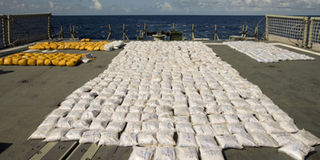US: Drug barons in Kenya feed on and fuel widespread graft

The Royal Australian Navy frigate, HMAS Darwin, displays the record Sh25 billion heroin haul seized east of Mombasa on April 24, 2014.Security agencies suspect a Pakistani link in the Sh23.2 billion heroin seized and destroyed by Australian Navy off the Kenyan coast recently. PHOTO | FILE |
What you need to know:
- The blunt assessment of illegal drug trade in Kenya is contained in the 2015 edition of the department’s global report on narcotics control.
- It adds that national authorities are doing little to combat drug trafficking.
NEW YORK
Drug traffickers are feeding on and fuelling corruption in Kenya’s government and business, the US State Department said Wednesday.
The blunt assessment of illegal drug trade in Kenya is contained in the 2015 edition of the department’s global report on narcotics control.
It describes Kenya as “a significant transit country for illicit drugs, including Southwest Asian heroin and South American cocaine, with growing domestic users.”
Stemming this illicit trade is “an enormous challenge,” the State Department says.
“Drug traffickers take advantage of corruption in government and businesses,” the report adds. “Proceeds from drug trafficking are used to further fuel the corruption of Kenyan institutions, adversely impacting the lives of citizens far removed from the drug trade.” Graft linked to narcotics permeates key segments of Kenyan society, the US observes.
“Drug barons use proceeds to contribute to political campaigns and to buy influence with government officials, law enforcement officers, politicians and the media,” the report states.
DOING LITTLE
It adds that national authorities are doing little to combat drug trafficking.
“Despite rhetoric from Kenyan political leaders, there has been a lack of action in the form of high-level prosecutions or interdiction,” the State Department reports.
“Only a tiny fraction of the drugs believed to transit in and through Kenya are seized by authorities. Due to a lack of both political will and institutional capacity, arrests rarely lead to convictions. When convictions do occur in Kenya, they are of lower-level couriers and distributors.” The US also offers a mixed appraisal of Kenya’s performance in combating money laundering and financial fraud.
The report notes the upgrade Kenya received last year in a US analysis of countries’ efforts to prevent and prosecute financial crimes, including the funding of terrorist organisations. Kenya achieved “significant progress” in this regard adding that “the Kenya Revenue Authority has made recent strides in improving internal monitoring.”
A Kenyan law on the proceeds of crime and money laundering provides a framework for addressing money laundering, and it puts in place “appropriate sanctions,” the US report adds.
“But this law “has never been used to prosecute financial crimes,” the State Department says.
“Kenya’s banks are growing in sophistication. Money laundering and terrorism financing occur in the formal and informal methods and derives from domestic and foreign criminal activity.”




